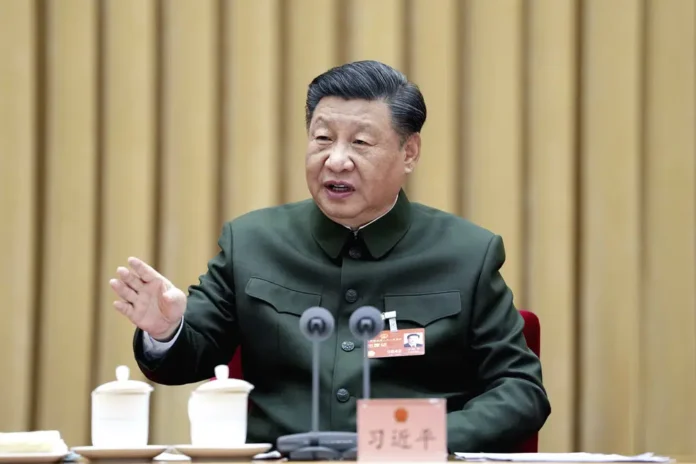BEIJING (Reuters) — China’s leader Xi Jinping has called for “more quickly elevating the armed forces to world-class standards,” in a speech just days after a top diplomat warned of the growing possibility of conflict with the U.S. unless Washington changes course.
China must maximize its “national strategic capabilities” in a bid to “systematically upgrade the country’s overall strength to cope with strategic risks, safeguard strategic interests and realize strategic objectives,” Xi said Wednesday.
His remarks to delegates in the ceremonial parliament representing the People’s Liberation Army, the military wing of the ruling Communist Party, and the paramilitary People’s Armed Police, were carried by the official Xinhua News Agency.
Xi issued a series of calls to accelerate the build-up of self-reliance in science and technology, bolster strategic capabilities in emergency fields, make industrial and supply chains more resilient and make national reserves “more capable of safeguarding national security.”
The program laid out by Xi dovetails with a number of national strategies already underway, including the “Made in China 2025” campaign to make China dominant in 10 key fields from integrated circuits to aerospace, and a decades-old campaign for civilian-military integration in the economy.
Xi also mentioned the need for “achieving the goals for the centenary of the PLA in 2027,” a date by which, according to some U.S. observers, China intends to have the capability of conquering self-governing Taiwan, an American ally, by military means.
China has defined the centenary goals in mostly vague terms, such as greater “informatization” and raising the PLA to “world-class standards.”
China needs to build “a strong system of strategic deterrent forces, raise the presence of combat forces in new domains and of new qualities, and deeply promote combat-oriented military training,” according to a speech Xi gave last year.
On Tuesday, Foreign Minister Qin Gang had warned in unusually stark terms about the possibility of U.S.-China frictions leading to something more dire.
“If the United States does not hit the brake, but continues to speed down the wrong path, no amount of guardrails can prevent derailing and there surely will be conflict and confrontation,” Qin said in his first news conference since taking up his post last year.
“Such competition is a reckless gamble, with the stakes being the fundamental interests of the two peoples and even the future of humanity,” he added.
That echoed remarks made by Xi on Monday to delegates that seemed to underscore Chinese frustration with U.S. restrictions on access to technology and its support for Taiwan and regional military blocs in unusually blunt terms. “The United States and other Western countries have comprehensively contained, surrounded and suppressed China, posing unprecedented challenges to China’s development,” Xi Jinping told the state-run Xinhua news agency.
State Department spokesman Ned Price said Washington wants to “coexist responsibly” in the global trade and political system and that he has no intention of suppressing China.
“It’s not about containing China. It’s not about suppressing China. It’s not about holding back China,” Mr. Price said in Washington. We want to “fairly and constructively compete” and “not get involved in conflicts.”
Meanwhile, U.S. military commander General Laura J. Richardson, the Southern Command in charge of South America and the Caribbean, told the House Armed Services Committee that China and Russia would “use their influence aggressively.” He said it was a “malicious actor”.
China is “engaging in gray area operations to spread malicious influence, wield economic power, and expand military and political access and influence,” Richardson said.
“This is a strategic risk that cannot be accepted or ignored,” she added.
Thursday, May 9, 2024
More
© London Post, All Rights Reserved by Independent Media Group UK Limited.






